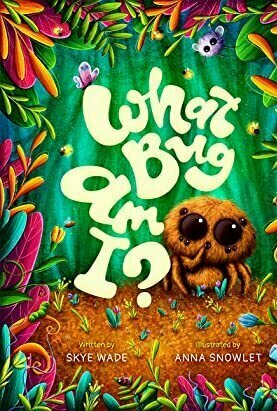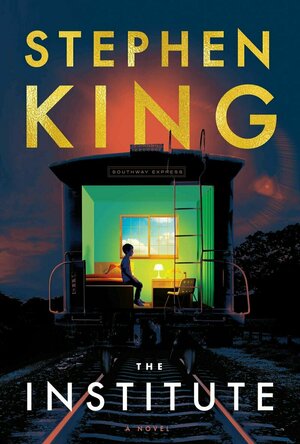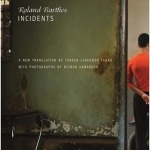
Incidents
Roland Barthes and Teresa Lavender Fagan
Book
French philosopher and literary theorist Roland Barthes was one of the leading influences on the...
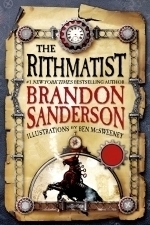
The Rithmatist
Book
From #1 New York Times bestselling author Brandon Sanderson: his debut novel for the young adult...
fantasy middle grade
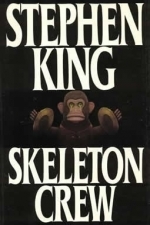
Skeleton Crew
Book
The Master at his scarifying best! From heart-pounding terror to the eeriest of whimsy--tales from...
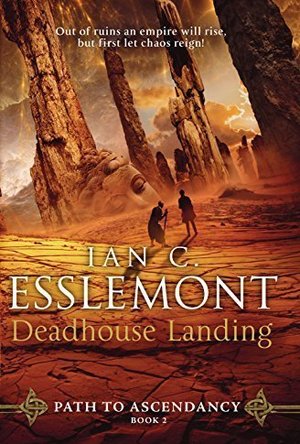
Deadhouse Landing
Book
Returning readers to the turbulent early history of what would become the Malazan Empire, the second...

Found Innocent (Detective Madison Knight Series Book 4)
Book
She wanted to leave her past behind, but it may have followed her… A young woman’s remains...
series crime fiction mystery police procedural Carolyn Arnold
How To Succeed in Witchcraft
Book
An overachieving teen witch vies for a prestigious scholarship at her elite high school in this...

Emanuela Orlandi and Ettore Majorana: Two Italian Mysteries Resolved?
Book
Discover the captivating true stories of Emanuela Orlandi and Ettore Majorana in this compelling...
Hadley (567 KP) rated The Institute in Books
Oct 24, 2019
So why is the government kidnapping children to conduct psychic research on them? At first, it may seem just that: psychic research, because psychic powers seem to be more powerful in young children than adults, but nothing is what it seems. As the boss of this Institute says to the children: " ' There's a war going on, and you have been called upon to serve your country.' " A few sentences later, and she explains it a little more in depth for Ellis: " ' This is not an arms race but a mind race, and if we lose, the consequences would be more than dire; they would be unimaginable. You may only be twelve, but you are a soldier in an undeclared war. The same is true of Kalisha and the others. Do you like it? Of course not. Draftees never do, and draftees sometimes need to be taught that there are consequences for not following orders. I believe you've already had one lesson in that regard. If you're as bright as your records say you are, perhaps you won't need another. If you do, however, you'll get it. This is not your home. This is not your school. You will not simply be given an extra chore or sent to the principal's office or given detention; you will be punished. Clear? ' "
King writes in a third-person point-of-view, which makes it a little disturbing that when any female character he introduces (including girls as young as 11-years-old) are usually introduced by their breast size. It's not uncommon for male writers to introduce female characters this way, but when most of them are children, it can be very off putting for readers. One scene, King makes Ellis notice that Kalisha has 'her hands on her mostly nonexistent hips,' then writes about the character Helen in the same scene: " Another door opened and Helen Simms appeared, clad - - - sort of - - - in what Luke believed were called babydoll pajamas. She had hips, plus other interesting equipment. " Both of these characters are only twelve-years-old.
Aside from the children, King also introduces an important character named Tim Jamieson. This character starts the novel off before readers meet Ellis; we learn that he is a former cop who is traveling to New York while taking odd jobs on his way there, including a night knocker job in DuPray, South Carolina (which becomes very important later on in the story) .
Avery, my personal favorite character in the book, is a ten-year-old who acts like a five-year-old, " The screamer was a little boy in Star Wars pajamas, hammering on doors with small fists that went up and down like pistons. Ten? Avery Dixon looked six, seven at most. The crotch and one leg of his pajama pants were wet and sticking to him. " Dixon and Kalisha are both in the Institute for telepathy. " 'You know so,' Kalisha said, and began to stroke the little boy's [Dixon] hair again. Like had a sense - - - maybe bullshit, maybe not - - - that a lot was going on between them. Inside traffic. " And quickly, the group of children become protective of Dixon, " 'But you need to take care of this one for as long as you can. When I think of Tony or Zeke or that bitch Winona hitting Avery, it makes me want to cry. ' " Kalisha confides in Ellis.
Kalisha, one of the other children that has been kidnapped, is another very likable character that seems to keep all of the other kids' spirits up by either keeping them out of trouble with advice or stopping small fights between them. Another kid named Nicky, the troublemaker of the group, is the stereo-typical bad boy. He gets involved in fistfights with the orderlies that work at the Institute, taking quite a bit of abuse in return. But eventually, the rebelliousness catches up with him, leading him to be moved from Front Half to the dreaded Back Half.
Readers later learn that Back Half is worse than Front Half. Most questions we may have about why the Institute is abusing these children are all answered when readers get to see into Back Half from Kalisha's point-of-view. But what is left unanswered is exactly how many children have been through the Institute? From the amount of children seen just in this story, the numbers could be in the hundreds of thousands!
But, as expected, the children come up with a plan to escape - - - with giving as little detail as possible, an orderlie at the Institute is helped by one of the children with a personal problem, and in return, this orderlie decides to help one of them escape and reveal everything that is the Institute. The instance the escape starts being discussed is when the book really picks up.
King's writing of the abuse our characters sustain is very real (" When Stevie Whipple asked where he'd been and what was wrong, Luke just shook his head. He didn't want to talk about the tank. Not now, not ever. He supposed it was like being in a war. You got drafted, you went, but you didn't want to talk about what you'd seen, or what had happened to you there." ) The scene in which Ellis refuses to speak of is where the orderlie Zeke is trying to make Ellis confess that he is not only telekinesis, but also telepathic: "Zeke hauled him up by the hair. His white tunic was soaked. He looked fixedly at Luke. 'I'm going to put you down again, Luke. Again and again and again. I'll put you down until you drown and then we'll resuscitate you and drown you again and resuscitate you again. Last chance: what number am I thinking of?' "
King brings up a fictional belief that strikes fear in parents everywhere: children being kidnapped for government experiments. Readers witness Ellis' parents being killed, Kalisha being a surrogate mother to kids she barely knows, Nicky being beaten by adults when he refuses to get 'shots for dots,' night terrors, suicide, zap sticks and murder.
This book doesn't read like a regular King book; even with the paranormal aspects occurring in it, it doesn't add up to much. The horror aspect is more in the form of child abuse then paranormal moments. I would only recommend this book to fans of Netflix's 'Stranger Things' and Patterson's 'Maximum Ride.' I don't think I would read this again.
Night Reader Reviews (683 KP) rated Secrets in Books
Nov 18, 2020
Posy Waiters’s is a fifteen year old girl who has always questioned her parent’s love for her. This is mainly because she hardly knows them since they travel all the time for work and rarely see her. Sometimes they even forget to send her a card on her birthday. Posy lives all alone except for the live-in nanny who is only there for the money Posy’s parents are paying her. One day all this suddenly changes.
Posy’s parents tragically die and leave Posy to their friends whom Posy has never even heard of let alone met. Her greedy nanny doesn't even stick around to help her pack after hearing the news. Now Posy is living in San Francisco with the Forests but things are not quite what she thinks. While exploring the cellar of her new home Posy discovers something that will change her life forever.
I just loved how many twists there were in this book, some of which actually surprised me. One of the biggest surprises actually appeared at the very end of the book and was a real shocker (though it left a bunch of questions I feel will go unanswered as I don’t believe there is a sequel coming). I also enjoyed the loyalty and non-judgmental attitude for the friends, a rare trait anymore. There are quite a few errors in the book but that is not my largest complaint. My main issue is just how oblivious Posy and Alex are frequently. I also felt like the author occasionally forgot how old (or young) the characters are, such as when a sixteen year old Posy buys a cocktail dress.
Teens to young adults would probably like this book the most. This is largely because it doesn't go into a lot of detail. I also don’t believe the unanswered questions will bother younger readers as much. However, incest is a big subject in this book (and sex is hinted at) and those unable to handle it should refrain from reading this book. I rate this book 2 out of 4 or 3 out of 5. The book would have been much better if it answered ore of the question that it created. That along with the errors and age appropriate behavior (or lack there of) of the characters really damaged my view of the book. If going off of the plot alone I would say the book is extremely good.
